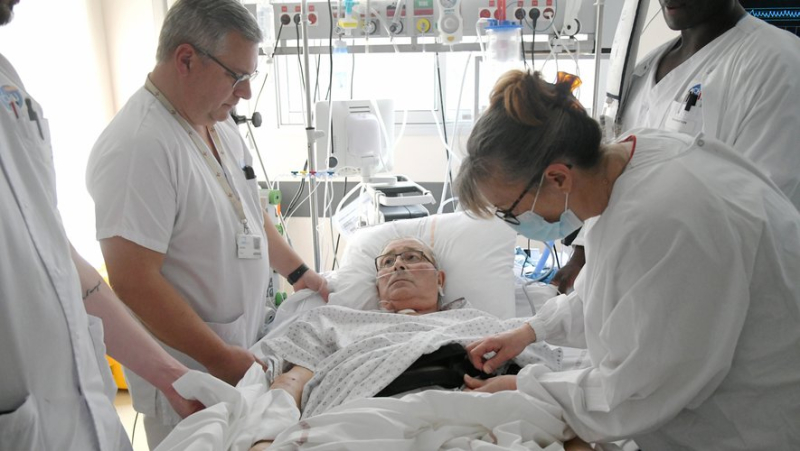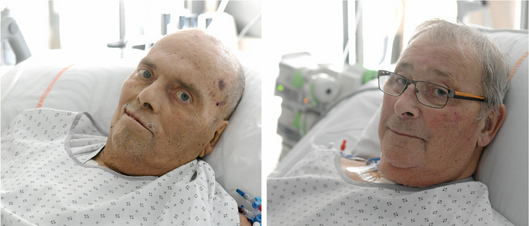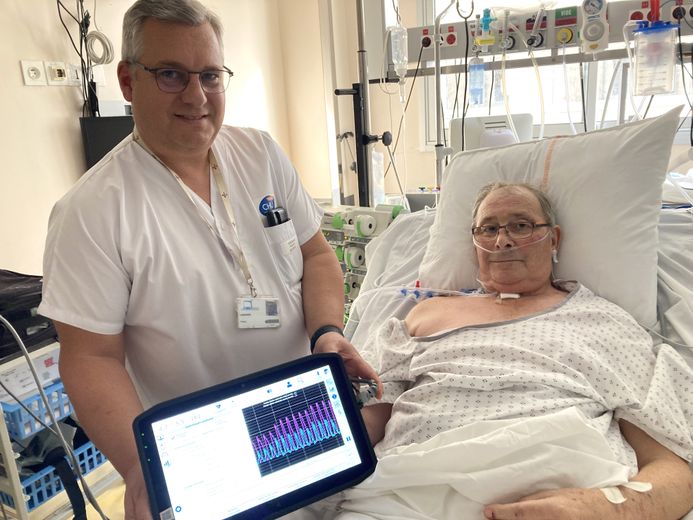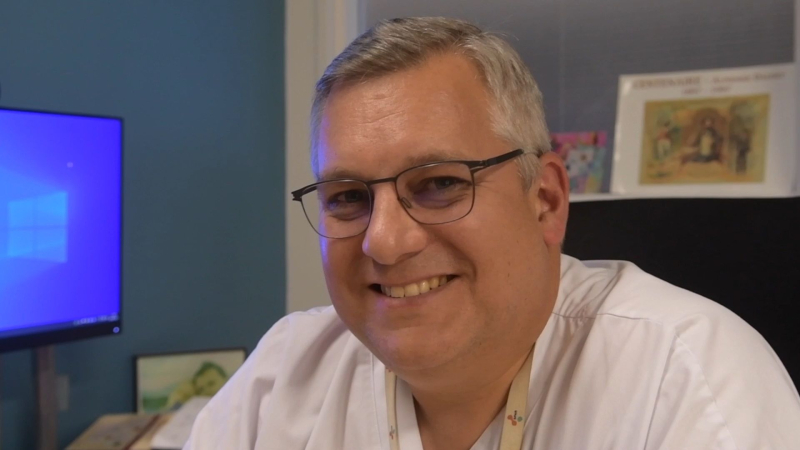“Carmat saved me”: implanted at the Montpellier University Hospital, they talk about their lives with the artificial heart

Jean-Bernard Gadolet avec l'équipe de réanimation d'Arnaud-de-Villeneuve. Il a été transféré dans le service de chirurgie cardiaque ce vendredi 9 février. Midi Libre – MICHAEL ESDOURRUBAILH
On December 13 and January 23, Jean-Bernard Gadolet and Patrick Rey were implanted with a Carmat, the artificial heart, at the Montpellier University Hospital, the only center in the south of France to participate in the' Eficas clinical study, intended to validate the reliability and effectiveness of the device. It is coordinated by Professor Philippe Gaudard, head of the intensive care anesthesia department at Arnaud-de-Villeneuve hospital.
"T… t… t… t…" Lying in a bed in the intensive care unit of Arnaud-de-Villeneuve hospital, Jean-Bernard Gadolet, 70, beats time like the beats of a metronome. To the question "How do you feel with the Carmat ?", the gesture echoes the perfect curves of the electrocardiogram, and the reassuring words of the retiree, who came from Bourg-en -Bresse to receive an artificial heart at the Montpellier University Hospital, on December 13.

The history of Carmat. SOPHIE WAUQUIER
This is the first implementation of Carmat in the south of France, ten years after the launch of the adventure offered to 50 patients in Europe. The Montpellier University Hospital is one of the French centers authorized to offer the device to patients with severe heart failure, without the immediate possibility of a transplant. The program is coordinated by Professor Philippe Gaudard, head of the anesthesia-resuscitation department at the Arnaud-de-Villeneuve hospital, coordinator of the Eficas clinical study, who will, of course, have to participate in the study. #39;by 2025, prove the effectiveness and reliability of the prosthesis.

"The Carmat saved my life", says Patrick Rey, 60 years old, implanted in turn on January 23 at the Montpellier University Hospital. The Biterrois arrived at the end of a complex medical journey, after a heart attack in 2011, a double bypass… until hospitalization in intensive care just before the installation of the Carmat. "The recent times were very difficult", relates Professor Gaudard.
"I advance science, that's why I'm here", also testifies Patrick Rey, still hospitalized in intensive care.
"I was at the end of my rope, it's not a life"
"So, you are leaving us, Mr. Gadolet ?" This Thursday, February 8, Jean-Bernard Gadolet is preparing to leave the "rea" to reach the cardiac surgery hospitalization department, one floor above. He spent the morning in a chair and walks daily. Sylvie Méjean, the coordinating nurse, dives into the documents that will allow her patient to "handle" the Carmat, and which will the subject of therapeutic education, in the hospital then in the recovery phase in rehabilitation, before returning home.

Professor Gaudard and his first Carmat patient, Jean-Bernard Gadolet.
Last July, it was "at the end of the rope" : "I was tired, I was on oxygen constantly, it was no longer a life. Carmat, I had heard about it, like everyone else. I made the decision in my soul and conscience, in agreement with my family, and I went with peace of mind because it was the solution that seemed most suitable to me , even if the operation was cumbersome. Otherwise, I remained as I was, under assistance, with two pump consoles to manage because I have insufficiency of the right ventricle and the left ventricle of the heart.

Candidate for transplant, Jean-Bernard Gadolet had little chance of receiving a transplant, given his age and profile, recalls Professor Gaudard, who mentions an intervention < em>"difficult". Surgeons Philippe Rouvière and Alexandru Nigoléan operated for eight hours.
"I had a sword of Damocles hanging over my head"
Jean-Bernard Gadolet has been getting up for a few days, after "two months of an unusual stay in intensive care", underlines Professor Gaudard. will have fully recovered and the Carmat will have revealed some of these secrets, the prosthesis will be removed from him and he will become a priority on the waiting lists, according to the protocol established in the clinical study. nbsp;Hoping that it will show that'"one day, patients will be able to keep the artificial heart for the rest of their lives",
Between the constraints and the risk of a clinical trial, and the result for the patient, the outcome is, for the moment, win-win: "Today, I have no apprehension. I already had a defibrillator, a machine in my body… we can't guess the future, but I no longer have a sword of Damocles above of the head, it's only a benefit! ", welcomes the first Carmat patient from Montpellier.
If he lives "day to day", he can't wait to see his family again, and her two grandchildren who sent words of encouragement posted at the foot of her bed. The doctor promised: "You will be able to return to a normal life".
Prof. Philippe Gaudard: “The most urgent patients, without alternative solutions”
Professor Gaudard is head of the intensive care anesthesia department at Arnaud-de-Villeneuve hospital.
How did you select the first surgical patients ?
These were the most urgent patients, with no alternative solution. The choice was made in a multidisciplinary meeting, depending on the pathology and the patient's condition.
How many patients should be implanted with an artificial heart at the Montpellier University Hospital ?
Five new patients in 2024. That's the goal.
How do candidates get to you ?
By a medical professional, by their cardiologist.
It's a pride to participate in the program ?
I don't know if it's a source of pride, in any case, it's an exciting adventure. We joined this program with great enthusiasm and the first two implementations confirm this feeling. Many conditions are required to enter the program, which is reserved for a few patients, but it is a hope for the future which broadens our therapeutic panel.
I subscribe to read more




